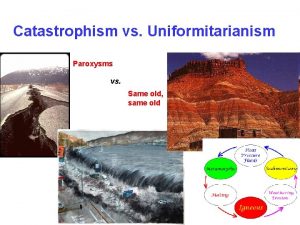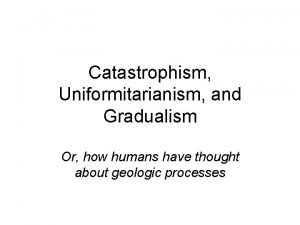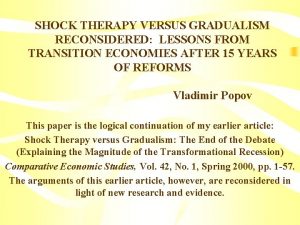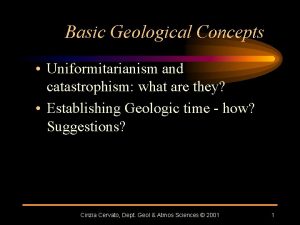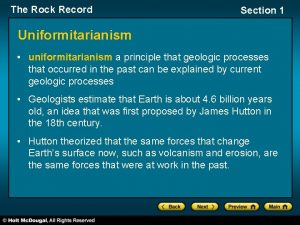Catastrophism Uniformitarianism and Gradualism Or how humans have











- Slides: 11

Catastrophism, Uniformitarianism, and Gradualism Or, how humans have thought about geologic processes

Neptunism • Abraham Gottlob Werner, 1787 • All rocks precipitated from ocean water • Problems?

Catastrophism • Baron Georges Cuvier, late 18 th – mid-19 th century • Researched fossils and extinction • Series of six major catastrophes • • “All of these facts, consistent among themselves, and not opposed by any report, seem to me to prove the existence of a world previous to ours, destroyed by some kind of catastrophe. ” Problems?

James Hutton and Uniformitarianism • “The past history of our globe must be explained by what can be seen to be happening now. ” • Plutonism - igneous rocks result from the cooling of hot magma • What kinds of processes did Hutton imagine had shaped the world in the past?

Siccar Point Hutton’s Unconformity Photo credit: Dave Souza, Wikimedia Commons

Evidence of mountain-building

Charles Lyell • Principles of Geology • “The present is the key to the past. ” • Much better writer than Hutton; disseminated idea of Uniformitarianism to a much wider audience

Lyell and Darwin Charles Darwin • Lyell was one of the first scientists to endorse On the Origin of Species, although he disagreed with aspects of theory of natural selection • Why would Lyell’s work have been useful to Darwin?

Why is Uniformitarianism a more logical approach to understanding Earth history? • Constancy of laws: In order to meaningfully study the past, we must assume the same or similar mechanisms operated then as now. Otherwise, how can we know anything about the past? • Parsimony: “Occam’s razor” • We know the earth is extremely old (how? )

Does Uniformitarianism mean that nature is ALWAYS constant? • “Geologists do not deny uniformitarianism in its true sense, that is to say, of interpreting the past by means of the processes that are seen going on at the present day, so long as we remember that the periodic catastrophe is one of those processes. Those periodic catastrophes make more showing in the stratigraphical record than we have hitherto assumed. ” – Ager, Derek V. (1993). The Nature of the Stratigraphical Record, 3 rd Ed. . Chichester, New York, Brisbane, Toronto, Singapore: John Wiley & Sons. pp. 83– 84.

From Uniformitarianism/Gradualism to “Actualism” • Uniformitarianism was a huge step in the right direction • Evidence exists that there have been different intensities of geological activity during the past Deccan Traps near Mumbai, India Series of intense volcanic eruptions ~66 mya
 Uniformitarianism and catastrophism venn diagram
Uniformitarianism and catastrophism venn diagram Catastrophism vs uniformitarianism
Catastrophism vs uniformitarianism Gradualism vs uniformitarianism
Gradualism vs uniformitarianism Compare and contrast gradualism and punctuated equilibrium
Compare and contrast gradualism and punctuated equilibrium The origin of species chap 24
The origin of species chap 24 Gradualism graph
Gradualism graph Gradualism vs punctuated equilibrium
Gradualism vs punctuated equilibrium Site:slidetodoc.com
Site:slidetodoc.com Gradualism
Gradualism Punctuated equilibrium
Punctuated equilibrium Shock therapy vs gradualism
Shock therapy vs gradualism Australian marsupials convergent evolution
Australian marsupials convergent evolution

